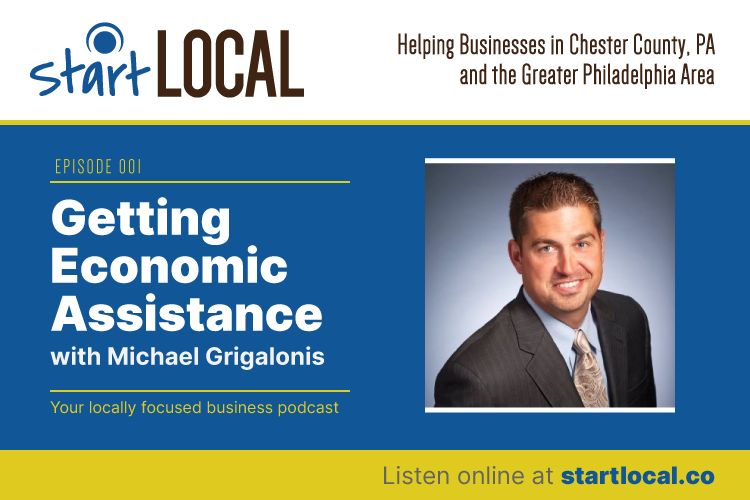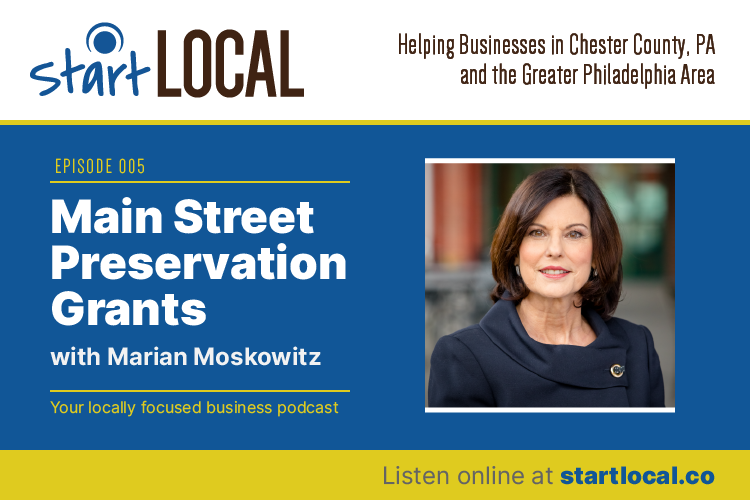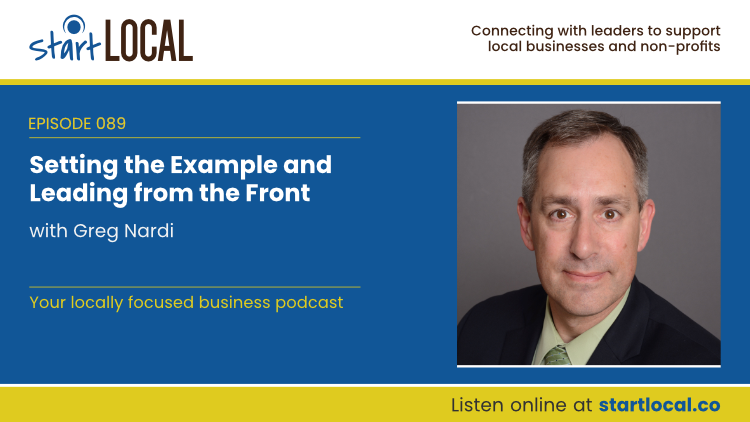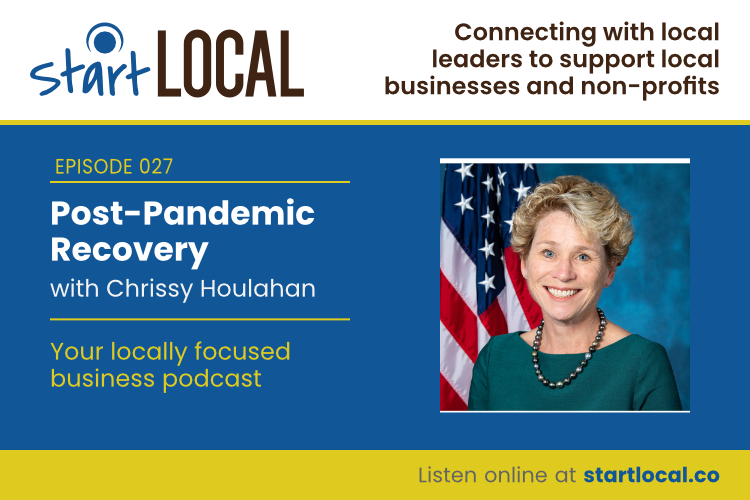
Podcast published: April 10, 2020
Businesses all over the country are being impacted by COVID-19 and the stay at home orders issued by most states. Local, State, and Federal governments have tried to mitigate the damage with economic assistance in the form of funding. To learn a bit more about how Chester County business can get economic help, we’re talking to Michael Grigalonis, Chief Operating Officer and Executive Vice President, Chester County Economic Development Center.
Show Notes
Episode Highlights
What have the last few weeks been like?
- Retail/main street business impacted most dramatically.
- As soon as Chester County got stay-at-home orders, CCEDC conducted a business impact statement.
- Loud and clear: business are desperate for capital.
- The team at the CCEDC were able to process 112 out of 400 loan applications, submitting those to the State of PA in Harrisburg. This is the highest amount of any applications submitted to the state by any workforce development organization.
What help is still available for local businesses?
- PPP (Payroll Protection Program) – If that runs out of money, there will likely be more money available in due course.
- There will likely be more programs and more money.
4. Where can local businesses find more information?
- Keep an eye on the CCEDC website
- CCEDC maintains an up-to-date COVID-19 Business Assistance Resources
Intro: Hello, everybody. And welcome to the first episode of the Start Local podcast, a podcast dedicated to helping businesses in Chester County, Pennsylvania and the greater Philly area.
Joe Casabona: I’m your host, Joe Casabona. I’m here with my co-host, Liam Dempsey. And today, our guest is Michael Grigalonis, Chief Operating Officer and Executive Vice President at the Chester County Economic Development Council. Mike, how are you today?
Michael Grigalonis: Doing well, Joe. Thanks for having me.
Joe Casabona: Awesome. Thanks for being here. Liam, how are you?
Liam Dempsey: Yeah, fantastic. Fantastic.
Mike, Thanks so much for joining us. I read in a blog post this morning on the CCEDC’s website, I think it was the last three weeks have been the busiest of your entire career. And before I get into asking you about, what it’s been like and how your office and organization has been responding to the coronavirus, tell us a little bit about who you are and your role at the Chester County Economic Development Council and what you do there.
Michael Grigalonis: Sure. Yeah, I’m happy to do that. So, I’ve been at the Chester County Economic Development Council. I think for purposes of this conversation, we’ll refer to it as CCEDC. So, I don’t have to get that mouthful out every time, but I’ve been at CCEDC for about 20 years now. I joined there back in 1999 as a graduate intern, actually, from Villanova University and have been there since.
So, and for, I guess, for the last 15 years or so, I’ve served as a Chief Operating Officer. And my responsibilities range from management and administrative stuff from budgets and personnel, and those types of things to programmatic things, whether that be some international business programs or some workforce programs over the years, various programs, you know, over the course of 20 years.
So, it’s kind of a hybrid role, both programmatic as well as management and administration. It’s a fantastic organization. That’s why I’ve been there for 20 years. It’s got a great board, great volunteer leadership, very active executive committee that really gets into the trenches with us to figure out strategies and directions for which the organization ought to take. So, really, really enjoyed it and proud to have worked for CCEDC for so many years, and some great colleagues. And, yeah. I think I’ll kind of cut it there and maybe dive into some of the content here with you guys.
Joe Casabona: Yeah. That sounds great as I just have a question. You know, it’s you’ve been at this for 20 years. So this is not the first economic downturn you’ve seen, and maybe before we get into the current event stuff, what were some of the challenges that you saw and how is it different from maybe say the 2008, 2009 recession? That’s the one that I’m most familiar with cause I’m 34 years old. So, that’s the one that I remember the most. Can you give us a little bit of insight on that?
Michael Grigalonis: Yeah. Yeah, it’s interesting. I mean, looking back, I cannot say that this one is anything like 2008. I mean keep that this has been so acute I guess up until like through the end of February, things were pranking along. I know just from talking to business, our own organization, just everything. It was just kind of business as usual. And then all of a sudden you talk about falling off a cliff. So I don’t, I mean, to answer your question, I don’t really see them being comparable at all.
I mean 2008, 2009, 2007, whatever the exact timing was, was certainly painful, and, but it was much more gradual. And you could kind of see it coming,and there were trends emerging. And whereas this one was just all of a sudden you snap the finger and the entire economy was shut off like a light switch. And so, I don’t know that ever in the history of tracking economies has that experiment ever been conducted and, nor did I think any of the leadership, whether it be in DC or Harrisburg or wherever, really know what would happen. I think from a public health standpoint, everyone agreed it was necessary, but no one quite knew what would happen to the economy. And we’ve seen it, we’re living it. And it’s dramatic, and it’s, you know, it’s, I was expecting it to be dramatic, but I think it even exceeded what I might have contemplated. So, it’s a long winded answer, but I think that I don’t really see a comparison.
Joe Casabona: Thanks. Yeah. I think that helps kind of set the stage a little bit.
Liam Dempsey: So, you’ve been at the front line, so to speak, helping businesses. And, I know from speaking with some of your colleagues, and from what I read on the blog post this morning, that it’s been busy. And you’re seeing businesses. When we say small, you know, what does the federal government say small? Anything under something like 500 or a thousand employees? And for Joe and I, those are big businesses. But, you’ve been seeing all sorts. Maybe you can tell us a little bit about what you have seen in an economic sense and what are the very real kind of anecdotes that are crossing your desk and your colleague’s desk. And then maybe also touch on what you and your colleagues have been doing over the last few weeks to respond and to help.
Michael Grigalonis: Yeah. I think what we have seen is that I’ve not talked to a business yet, and I’ve talked to a lot of them, and I’ve not found one that hasn’t been impacted. Of course, some have been impacted much more than others. I mean, your retail and your Main Street businesses are being impacted dramatically. And I guess from our perspective, we’ve worked a lot with those types of business, much more than we normally would. They were the ones that had been most active with the first round of funding. And I guess I should back up for a second.
So, immediately when this happened, when Chester County went into the stay at home, if you recall, we went stay at home a little bit before some of the other parts of the state. So, as soon as that happened, we partnered with the county and with the county chamber to conduct a business impact assessment to try to get our arms around. Where were the business heads? What is it that they really needed? And what came away really, really loud and clear was they were desperate for capital. Even though it was only a week, two weeks, a lot of these small businesses are operating on very thin margins. And to shut that revenue off for a couple of weeks was relly, really difficult for them. So they were all desperate to see cash. And so, once we learned that we knew we had to be really aggressive. And of course we have a seven person loan team that that’s one of our core competencies. It’s what we do for a core piece of what we do for, you know, year round in a normal cycle. So we were well prepared to do that, but knew that we also had to take other people, William, you know, people like Jim Lochner and Patrick Hayakawa, folks like that, that don’t normally get involved in loan programs.
We had to bring them into the fray so we can handle the demand we knew we were going to get. And, we were not wrong. The application period ended or opened, I think it was two weeks ago tomorrow. and weA got in a matter of 24 hours, we got a couple hundred applications. It opened on a Wednesday afternoon, by Sunday I think we had almost 400 applications. And these were not insignificant. These were not one page applications that required you to pull financials and pull debt schedules and tax returns. So, there was some effort that companies had to do to put this application forth.
And so the demand for that program, it’s not just Chester County. That was statewide. I mean, there are thousands and thousands of applications received. Proud to say that in Chester County, we were able to process 112 of those 400 plus applications that we got process meeting, make sure all the documentation was there, do some basic underwriting package and submit it to the state.
So, anecdotally, I’m told that was the largest or the highest amount of applications submitted by anyone in the state. So, yeah. You know, we’re proud that we were able to respond and adapt as quickly as we could. We’re, you know, certainly disappointed that we couldn’t fund every business. There are many out there that are disappointed candidly. Some are angry. It was really a first come, first serve process. We had no other choice. That’s how it was kind of position at the state level as well. So, you know, we worked as hard as we could for Chester county to get as many applications in there as we could. And again, unfortunately, we couldn’t serve everybody.
However, there is a federal program that’s online now that perhaps you’ve heard of called the Paycheck Protection Program. And that one has been very aggressively pursued as well as you would expect. I believe I heard yesterday after one full day, they had this is nationally, but they had 35 billion of applications in day one. So that program is in high demand. We’re not directly involved in that. That has to go through a bank. And so we have been supportive in trying to help companies navigate that and understand what the program is, and some of the rules and the nuances that are in there. And we’ve also supported some banks through some bank partners that we work with on a regular basis to help them process SBA loans. This program happens to be running through the SBA.. So we do have some expertise that we’ve been able to lend to some of our bank partners as well because a lot of it is foreign to them. I mean, they know what the SBA is but going through an SBA process is a little different than what a typical commercial bank might be used to. So, we’ve been able to I think be helpful helpful there as well.
So the real need that businesses have right now is cash, is capital. And so the state program kind of rolled out first the federal, that the PPP program is out there now. And I know businesses are really working hard to try to submit those applications now. So that’s what we’re in the mode of now on the sort of on the business side.
I mean, certainly, some of the workers that have been displaced have their own challenges with unemployment compensation and you know, what are they going to do to try to make sure that they can stay financially stable. But our focus to this point has been really on trying to get capital into the businesses.
Liam Dempsey: A couple of follow up questions. SBA is just small business administration. What does SBA stand for, Mike? That’s right. Okay. you’re nodding your head. And by just way of comparison, you said you got about 400 applications for these loans through the state that your office was able to package up and prepare for approval and send off to Harrisburg 112. Is that something your office does on a regular basis? And if so, how many do you normally turn around and what are the comparison numbers? You said you got 200 and change in a 24 hour period. Do you normally see 200 and change in a full year? Oh, what does it look like? Not coronavirus time.
Michael Grigalonis: Yeah, that’s a good question, Liam. And, so normally we’re doing SBA 504 loans for the most part. That’s our sweet spot in the state. That’s a program called PETA. Those are our two primary products that we use. And I would say that normal volume over the course of a year is 25 to 30 loans over the course of a year, something like that.
Now. they’re a little bit more involved, the application and the credit underwriting is a little bit more involved than what we just went through here with this current working capital program. However, it still gives you a sense of the scale that we were dealing with and the demand that is out there in the business community.
Liam Dempsey: Wow, that’s a number right there, isn’t it?
Joe Casabona: Yeah, that is, that’s quite a bit. And did you find that it was, I mean, was it all sorts of businesses or was it…would you say, mostly the ones that, you said are the most impacted, the retail and Main Street businesses.
Michael Grigalonis: Well, I would say industry wise, it was very diverse. I mean, from, you know, the from auto body shops to pizza joints to professional services firms. I mean yeah. I mean, every industry was well represented down the state program. It was defined as a hundred employees or less. So, we didn’t see any, you know, larger type companies just because they were not eligible for this particular program.
But, yeah. it was diverse as I said, in the opening, I mean, I don’t think there was an industry that was spared through this. I mean, certainly some are faring better than others, but no one has not, has everybody’s been impacted.
Liam Dempsey: So, that period of application has come and gone, and it sounds from what I’m hearing from you, Mike, is that the state’s first round of support cash, cash loans and the like is gone. The next step is this federal payroll protection program. One, is that correct? And two, do you know of additional programs whether they’re, you know, in the grass level, state grassroots level, or if there’s other things that are on the horizon, either through the state or through the county or through the federal government? Can you speak to what might be still be available?
Michael Grigalonis: Well, I think the pattern has been that, you know, these are massive machines when you’re talking about the state government and the federal government, and it takes, unfortunately, it takes them a little bit of time so they can figure out what the legislation is going to be, and then they have to actually roll it out through a programmatic or through, in this case, through the SBA. So it takes a little bit of time to get things kind of developed and introduced. And so I think that’s why you’ve seen, okay, the state came along, and then the feds came along. And I think over the course, again, depending on nobody, that’s what SBA research. Perhaps, most frustrating is that no one, there’s so much uncertainty. Nobody knows. Okay, May 1st, we’re all going to open our doors and we’ll be back to life as normal. And I think if we had that certainty, things would be a little bit easier and you can maybe plan for it. But we don’t have that. And I don’t think we’re going to have that.
So, I think, you know, so I think there will be more where I’m going with this response is that I think there ultimately are going to be more programs along with this plays out, you know, I’ve already heard speculation that if this PPP program runs out of money, there’s going to be an aggressive push to, you know, to put more money into it. Because I think, unfortunately, there are going to be some businesses that don’t get to that in time. There’s 350 billion, which sounds like a lot, but and it’s going to go, it’s going to go quick because it’s, as we said, it’s everybody. If you’re under 500 employees, you’re going to apply for the PPP program. There’s going to be very few exceptions to that. So, I think that there will be new programs. I can’t tell you sitting here right now what those programs are going to be, but I think there’s a realization on everybody’s part that we are going to need to do something. This is an economic environment that we’ve never, ever been in before.
Again, you’re talking about an entire world that’s been, in some ways, shut down an entire country. And in our case, just completely flipped upside down. And it’s just, I think everyone realizes that it’s going to take more than just kind of the natural over time. We’ll all get back. No, there’s going to be, have to be some aggressive injection of public programs to try to, you know, recover and jumpstart things. I don’t think there’s any question about that.
Liam Dempsey: Yeah. Thanks for that, Mike. So Joe, I’m going to jump in and ask if you’ve got any kind of last minute questions here for Mike, as we come up on our time.
Joe Casabona: Yeah. Yeah. That’s, that’s great. This has been really informative. I think that the, maybe the way we should end things is, as listeners, you know, listeners, are going to be hearing this at different points, where can they find the latest information for what they could do, or is there anything that they can do kind of today to find, you know, to To see if they can get more capital in their hands.
Michael Grigalonis: Yeah, that’s a great question, Joe. And I would suggest that they keep an eye on our website. We’re trying really, really hard to keep that, you know, as current, like up to the half hour, I would say, with information. And I would also offer our organization as a resource.
So one of the things that we tried to do since this is all hit is try to respond to every email, every voicemail. And in the first couple of weeks, there were a lot of them. But we feel like it’s our responsibility to respond to those and at least offer some assistance, offer direction, because this is new to people, right? I mean, the SBA and the CCDC, the PETA, all these acronyms, it’s just overwhelming. It’s coming at people. You know, in dramatic, just voluminous amounts that people can’t digest. And so what seems maybe simple to us is because we live in the world and we’ree dealing with acronyms constantly. It’s completely foreign to people. So we understand that. And we’re, again, committed. We feel a responsibility to really try to help guide businesses as best we can through this, through this very difficult time.
So I encourage people to check our website, call us, email us. All of our names are on there, all of our email addresses. And from the CEO all the way down, we’re all, you know, there. We all work there because we want to help. And we love our community, and we want to make a difference in our community. So, trust me. You are not bothering us to reach out. We want to help. That’s what we’re there for, and so, that perhaps a good way to kind of close this out.
Joe Casabona: Awesome. And that website for those of you who are wondering is [ccedcpa.com]. We will have a link to that, and everything we’ve talked about, some of the articles and other resources in the show notes over at [startlocal.co].
Mike, thanks so much for your time and your information. We really appreciate it. And we hope that the people listening will find that helpful.
Michael Grigalonis: Thank you both, Joe and Liam. I appreciate the opportunity to get the message out there, and it’s good being with you guys this afternoon.
Liam Dempsey: Thanks, Mike. I know you’ve been busy. I know you’re still busy, but we really appreciate you taking the time to share this important information with the folks in and around Chester County. Thank you.
Michael Grigalonis: Thank you.
Joe Casabona: Thanks so much to Mike for taking time out of his busy schedule to talk to us today to give you some helpful resources on how you can get assistance during the COVID-19 outbreak. I’m sure many of you are impacted by this. And the work that Mike is doing and everybody at the Chester County Economic Development Center, everything that they’re doing is geared towards helping small businesses like us.
So if you want to learn more, find more information or more resources, you can head over to [startlocal.co/001]. And there’ll be links and ways to subscribe to the show. And if you want to submit a question, you can submit a question there too. So again, that’s [startlocal.co/001].
Thanks so much for listening. And until next time, stay safe out there.


